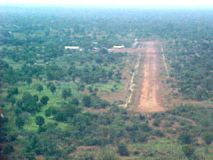Rumbek faces challenge to host new leaders of south Sudan
RUMBEK, Sudan, Jan 13 (AFP) — Many have promoted Rumbek, seat of the Sudan People’s Liberation Movement (SPLM), as a future southern capital but officials warn that the town may not even be able to host the region’s new government.
 “We have a lot of challenges,” said William Chut, the SPLM acting county secretary for Rumbek. “We are expecting the government to move here, but we have not got offices and accommodation ready.”
“We have a lot of challenges,” said William Chut, the SPLM acting county secretary for Rumbek. “We are expecting the government to move here, but we have not got offices and accommodation ready.”
Under the peace agreement which the SPLM signed last Sunday with the Khartoum government to end Sudan’s 22-year civil war, rebel leader John Garang is to become the country’s first vice president and president of the south.
The SPLM is to operate from Rumbek until Khartoum withdraws from the larger southern town of Juba, which under the peace deal will become the south’s capital for a six-year autonomy period followed by a referendum on secession.
SPLM officials have indicated he will form the southern government in Rumbek and that it may remain in the town for an indefinite period of time.
Located in the heart of southern Sudan, this former army garrison town of some 30,000 inhabitants has been the scene of intense battles between government forces and SPLM fighters. It changed hands more than once.
It finally fell to the SPLM in 1997, but not much was left of Rumbek, a town in a semi-arid part of southern Sudan inhabited by the Dinka, the largest ethnic group in the south.
“Right now there’s very little on the ground in terms of capacity,” said an official with the United Nations.
The town and the surrounding areas are mostly flat, with many trees, which line the main roads. Rivers and streams criss-cross Rumbek, an asset for its cattle and goat-rearing people.
Government soldiers tore off the corrugated iron sheets from the roofs of the town’s buildings, including hospitals and the once prestigious Rumbek Secondary School, which produced some of the south’s top leaders.
The army returned with Russian-made high-altitude bombers to finish off the remaining structures.
There is evidence of destruction everywhere. A disabled armoured vehicle can still be seen in front of the former Sudanese army commander’s residence, now used by SPLM officers.
United Nations agencies and non-governmental organizations operating in the region have helped the SPLM get health centres and schools up and running, but they admit a lot more needs to be done.
Rumbek town has no running water or electricity and there are no hotels to accommodate the dignitaries expected to show up for the huge peace rally and celebrations that the SPLM plans to hold.
But Rumbek already hosts the headquarters of several humanitarian groups and United Nations agencies.
Much of the supplies for the SPLM’s provisional capital arrive by land from neighbouring Uganda, a journey that can take up to 10 days during the rainy season.
Supplies also come in by air from Kenya, but the town’s airstrip, one of the busiest in southern Sudan, can barely handle large aircrafts. Light planes also have difficulty landing after the rains.
